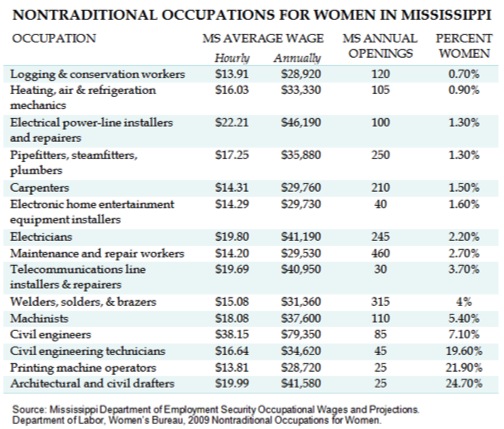Connecting Women To NonTraditional Occupations
June 22nd, 2011
In Mississippi, 55 percent of households headed by women live below the self-sufficiency level compared to 32 percent of male-headed households or 18 percent of households with couples.¹ The portion of female-headed households below self-sufficiency rises to 68 percent for women who are also single parents and financially providing for their children.
In Mississippi, women make up 48 percent of the state’s labor force.² They work across all industries and at all levels of the wage scale. In many industries, median wages for women fall below men’s wages. However, many occupations that are not usually pursued by women pay quality wages and offer upward career mobility. In an effort to transition more women into employment with higher wages, many states, including Mississippi, are working to connect women to training in fields labeled as nontraditional.
Click to enlarge
What are some examples of these nontraditional occupations?
The table lists 15 examples of nontraditional occupations across the spectrum of educational attainment for women, based on the percentage of women that work in that occupation nationally and details Mississippi wages and estimated annual job openings.
With women comprising almost half of the state’s labor force, strategies that aim to raise women’s wages also increase the economic security of children and communities. They also create a more skilled workforce.
Making training accessible to working women frequently requires support with child care, transportation, flexible scheduling and additional support as they enter a field with a traditionally male workforce. Providing training with these supports, as well as educational outreach to inform women about the broader spectrum of job opportunities available, are both important goals for leaders in education and workforce development.
Want projections more specific to your area? Click here and then select the link for your community college district.
Author:
Sarah Welker, Policy Analyst
¹Overlooked and Undercounted: Struggling to Make Ends Meet in Mississippi.
²Mississippi Department of Employment Security. http://mdes.ms.gov/Home/docs/LMI/Publications/Affirmative%20Action/AffAct2010.pdf






